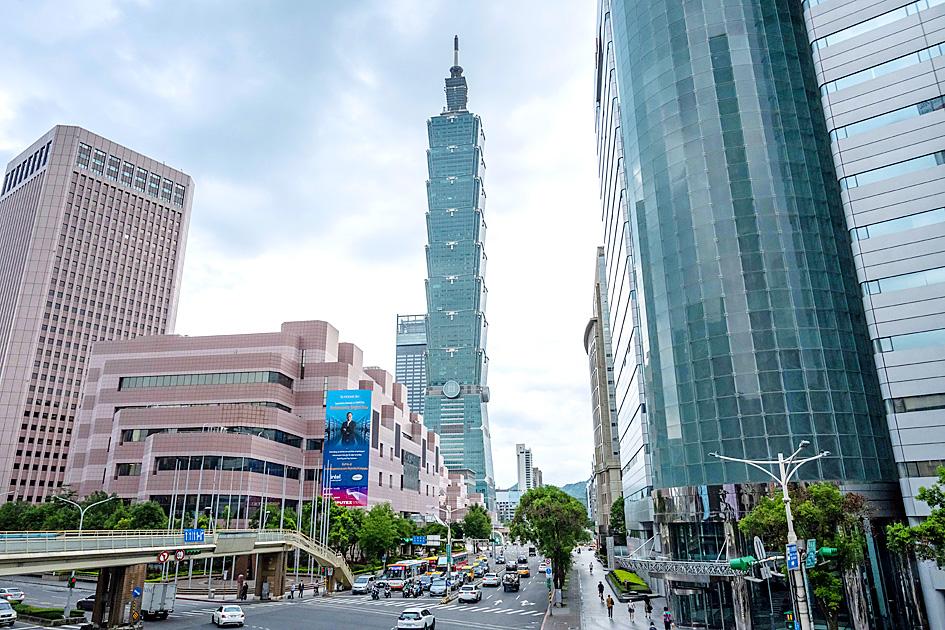Taiwan was ranked the world’s fourth-best investment destination in a report released last week by US-based Business Environment Risk Intelligence SA (BERI), down one notch from its previous ranking.
Taiwan garnered a profit opportunity recommendation (POR) of 61, ranking fourth among the 50 major countries assessed by BERI, which uses POR to gauge whether the business environment merits investment.
ASIA RANKING

Photo: Billy H.C. Kwok, Bloomberg
Taiwan finished behind Switzerland, Norway and South Korea in BERI’s first report of this year, but ahead of Singapore (sixth), China (12th), Japan (14th), Indonesia (17th), Malaysia (20th), Vietnam (22nd), the Philippines (23rd), India (24th) and Thailand (39th).
Each year, BERI issues its report in April, August and December.
Three key indicators are used by BERI to assess a country’s investment risk: operations risk, political risk, and a remittance and repatriation factor.
Taiwan remained third for operations risk, sharing the spot with Australia and following the US and Switzerland.
POLITICAL RISK
Regarding political risk, Taiwan finished 21st, down seven spots from the previous report in December last year.
It also finished seventh in Asia, behind Singapore, China, South Korea, Japan, Vietnam and Indonesia.
BERI forecast that Taiwan would fall to 24th in the political risk category by next year.
In the remittance and repatriation category, Taiwan retained the world’s top spot with a score of 80.
It also led the world in the category’s four subindices: accumulated international reserves, foreign-exchange generation, foreign debt assessment and legal framework.

South Korea’s equity benchmark yesterday crossed a new milestone just a month after surpassing the once-unthinkable 5,000 mark as surging global memory demand powers the country’s biggest chipmakers. The KOSPI advanced as much as 2.6 percent to a record 6,123, with Samsung Electronics Co and SK Hynix Inc each gaining more than 2 percent. With the benchmark now up 45 percent this year, South Korea’s stock market capitalization has also moved past France’s, following last month’s overtaking of Germany’s. Long overlooked by foreign funds, despite being undervalued, South Korean stocks have now emerged as clear winners in the global market. The so-called “artificial intelligence

‘SEISMIC SHIFT’: The researcher forecast there would be about 1.1 billion mobile shipments this year, down from 1.26 billion the prior year and erasing years of gains The global smartphone market is expected to contract 12.9 percent this year due to the unprecedented memorychip shortage, marking “a crisis like no other,” researcher International Data Corp (IDC) said. The new forecast, a dramatic revision down from earlier estimates, gives the latest accounting of the ongoing memory crunch that is affecting every corner of the electronics industry. The demand for advanced memory to power artificial intelligence (AI) tasks has drained global supply until well into next year and jeopardizes the business model of many smartphone makers. IDC forecast about 1.1 billion mobile shipments this year, down from 1.26 billion the prior

People stand in a Pokemon store in Tokyo on Thursday. One of the world highest-grossing franchises is celebrated its 30th anniversary yesterday.

Chinese artificial intelligence (AI) start-up DeepSeek’s (深度求索) latest AI model, set to be released as soon as next week, was trained on Nvidia Corp’s most advanced AI chip, the Blackwell, a senior official of US President Donald Trump’s administration said on Monday, in what could represent a violation of US export controls. The US believes DeepSeek will remove the technical indicators that might reveal its use of American AI chips, the official said, adding that the Blackwells are likely clustered at its data center in Inner Mongolia, an autonomous region of China. The person declined to say how the US government received